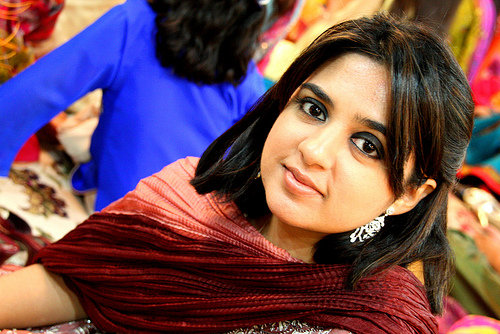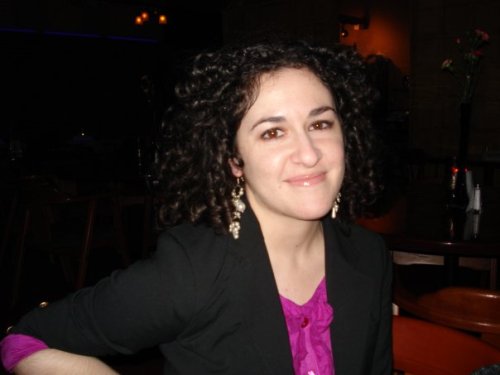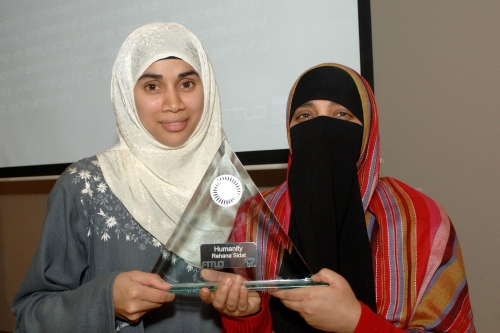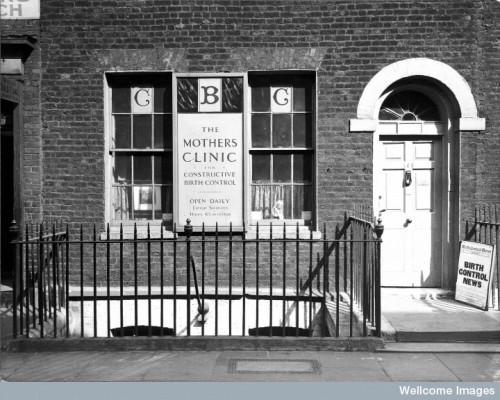Muslimahs in the Media Do it Themselves
by Arwa Aburawa
Not too long ago, if anybody wrote about Muslim women in the down-and-depressed, stereotypical manner then it would be left to some sensitive Muslim man to reply. Or more than likely, it would just be left. All that is changing due to a new generation of media-savvy Muslim women who are fighting back with articles, blogs and witty comebacks quicker than you

Asma Uddin of AltMuslimah
can say “oppressed housewife.”
“I think the hijab debate in France back in 2003 made us all realize that stereotypes we thought we had dealt with were still there,” explains Rajnaara Akhtar of Pro-Hijab, a UK-based campaign group which defends the right to wear the hijab. “Certainly in France, the view still seemed to be that Muslim women were oppressed and waiting to be rescued. We could not sit back in silence any longer and decided to engage in the debate.”
Rajnaara acknowledged that part of the problem was that until recently, Muslim women have been particularly reluctant to talk to the press. Fear and mistrust of the media meant the many were holding back and were consequently represented by Muslim men- something which proved rather counter productive. “I mean you can’t say ‘look at how free these women are’ but it’s a man saying it! It was high time that we used our knowledge and skills to represent ourselves.”
On a more global scale, the rise of the internet has meant that many Muslim women can now setup a blog or website and speak their mind without fear that their words are going to be misrepresented. News sites tackling inaccurate portrayals of Muslim women such as Muslimah Media Watch (MMW) and Altmuslimah are going from strength to strength. MMW which started life as a one woman blog in 2007 was recently re-launched as a website with a 21 plus blogging team hailing from places as far afield as Egypt to Switzerland.

Fatemeh Fakhraie of Muslimah Media Watch
Fatemeh Fakhraie, the US writer and founder of MMW, remarks that she was uncomfortable with the mainstream media’s tendency to portray Muslim women as either “exotic sex slave, oppressed woman, or dangerous terrorist” and so decided to setup the blog. MMW states that it tackles “one-dimensional and misleading” representations of Muslim women in everything from small-town newspapers and blogs to major news channels and women’s magazines-for example MMW questioned the consistently negative portrayal of Muslim women in Marie Claire.
Whilst this media intervention is certainly novel, it by no means reflects a sudden awakening amongst Muslim women. As Fatemeh explains, “Muslim women have been thinking and writing and participating since the beginning of Islam but I don’t think anyone’s been listening until now… I do think there’s been a wonderful influx of differing Muslim women voices in the last ten years in response to 9/11 and the fact that, as Muslims, we have been forced into a spotlight.”
This “spotlight” may also explain the success of these sites and organisations which, Asma Uddin of Altmuslimah insists, are taking issues that were previously restricted to academic circles and the masses and Muslim women are dealing with them in their daily lives.
The increasingly vocal reactions also reflect a new generation of Muslim women who are well-educated, smart and unafraid to question what they read in the news. As Asma explains, “As second generation American Muslim women we are a lot more concerned with civic engagement and dealing with the media than our parents, who were busy trying to make a living. We have more ownership and confidence to express ourselves.”

Rajnaara Akhtar presenting an award
Rajnaara, who lives in the UK echoed this sentiment stating that Muslim women identify themselves as British Muslims and are secure enough in their identity to stand up for what they believe. “We feel part of this society, we see ourselves as British… We don’t feel apologetic for our particular religious affiliations, so hopefully our positive engagement and responses will make it much harder for people to depict Muslim women in a stereotypical manner in future.”
Keywords: Muslim women in media, AltMuslimah, Muslimah Media Watch, Fatemeh Fakhraie, Asma Uddin, Pro-Hijab, Rajnaara Akhtar
Link to Elan Article
Like this:
Like Loading...







 Tadaa! The article on the Muslims who saved Jews during world war two that I was working on for Aquila Mag is now out- go and get yourself a copy. I wrote a little teaser back in January when it was Holocaust memorial day but this the whole story as well as a chat with Norman Gershman who photographed families involved in the event. I actually wrote two features for the magazine and they also have a mug shot of me for their green muslims feature… Well, you can’t win them all.
Tadaa! The article on the Muslims who saved Jews during world war two that I was working on for Aquila Mag is now out- go and get yourself a copy. I wrote a little teaser back in January when it was Holocaust memorial day but this the whole story as well as a chat with Norman Gershman who photographed families involved in the event. I actually wrote two features for the magazine and they also have a mug shot of me for their green muslims feature… Well, you can’t win them all. My latest piece for Manchester’s Radical History is on Ellen Tooley, the first woman MP for Eccles which is my hometown! Apparently, Eccles had always been full of great women : ) Here’s an excerpt:
My latest piece for Manchester’s Radical History is on Ellen Tooley, the first woman MP for Eccles which is my hometown! Apparently, Eccles had always been full of great women : ) Here’s an excerpt: I was lucky enough to get the chance to speak to the two women you see pictured above- Rifia and Seiha who are from Jordan- during their stay in India where they were training to become solar engineers. When I eventually managed to track them down (I just kept repeating ‘Jordan?’ to whoever picked up the phone at the college and it worked!), they seemed eager to speak to anyone who spoke Arabic- even if mine is a little on the dodgy side.
I was lucky enough to get the chance to speak to the two women you see pictured above- Rifia and Seiha who are from Jordan- during their stay in India where they were training to become solar engineers. When I eventually managed to track them down (I just kept repeating ‘Jordan?’ to whoever picked up the phone at the college and it worked!), they seemed eager to speak to anyone who spoke Arabic- even if mine is a little on the dodgy side.



